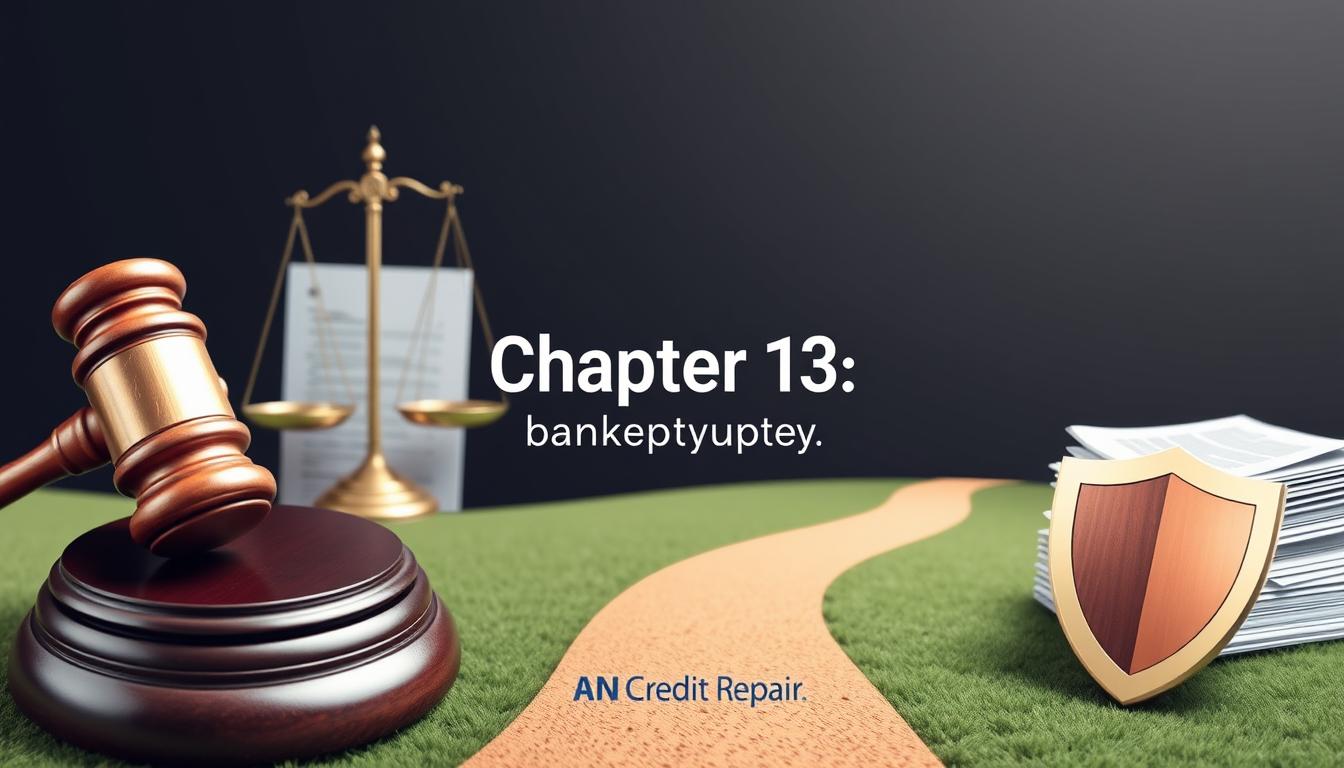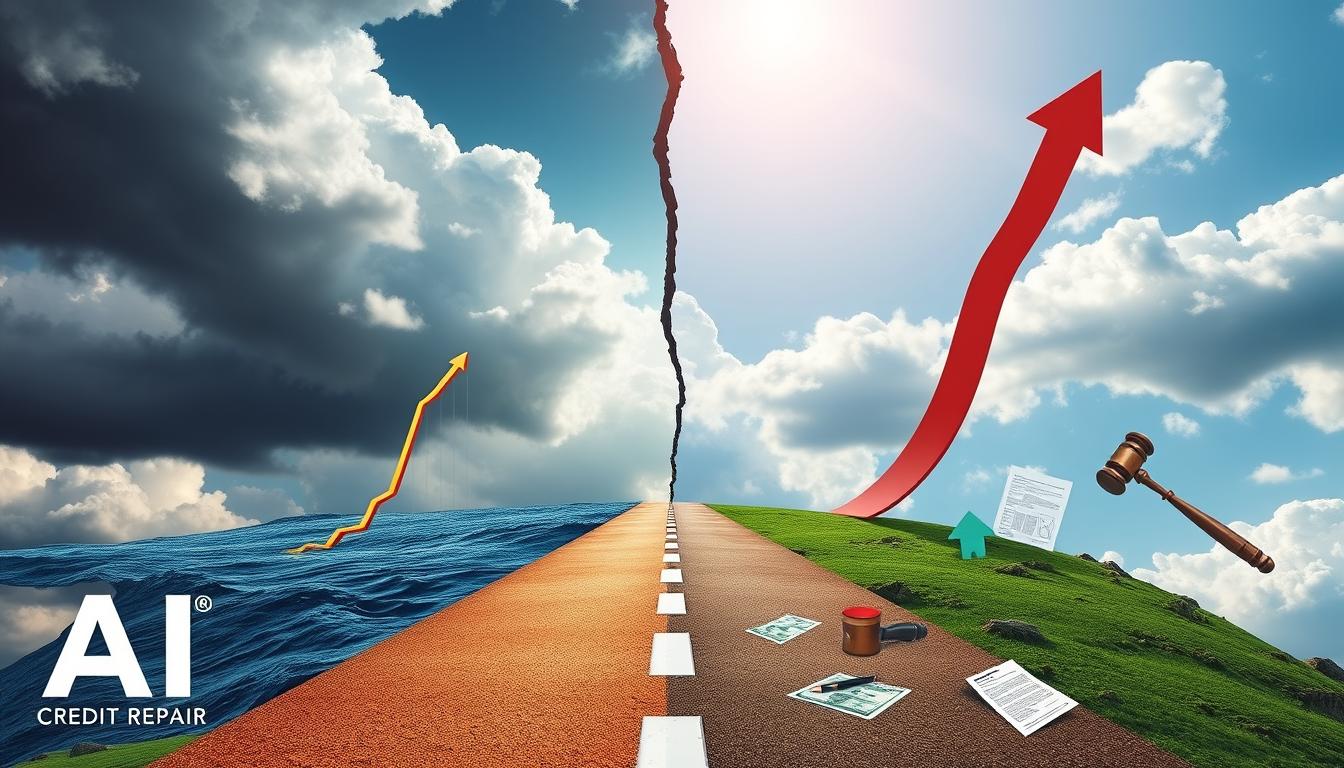Chapter 13 bankruptcy helps people restructure debts and regain financial control. It’s a common solution for those facing money troubles. However, many worry about how it affects their credit score.
Let’s explore the typical credit score after finishing Chapter 13 bankruptcy. We’ll also discuss steps to rebuild your credit and achieve financial stability.
Key Takeaways
- The average credit score after completing Chapter 13 bankruptcy is typically in the range of 550-650.
- The impact of Chapter 13 on your credit score can vary, depending on various factors such as your credit history and payment patterns.
- Rebuilding your credit after Chapter 13 is possible through responsible financial habits and strategic planning.
- Regular monitoring and reporting of your credit score can help you track your progress and identify areas for improvement.
- Understanding the credit score ranges and their implications can guide you towards achieving financial stability.
Understanding Chapter 13 Bankruptcy
Chapter 13 bankruptcy offers a structured approach to debt repayment and financial rehabilitation. This legal process helps individuals facing financial difficulties. Let’s explore the Chapter 13 bankruptcy process and eligibility requirements.
Overview of Chapter 13 Bankruptcy Process
The chapter 13 bankruptcy process involves creating a three to five-year repayment plan. Debtors make regular payments to a trustee, who distributes funds to creditors. This approach helps catch up on missed payments and addresses unsecured debts.
Eligibility Requirements for Chapter 13
To qualify for chapter 13 bankruptcy, individuals need a regular income source. There are specific limits on secured and unsecured debt amounts. Debtors must also pass a means test to ensure their income is below a certain threshold.
Understanding the chapter 13 bankruptcy overview and eligibility requirements helps individuals make informed decisions. This knowledge can guide them towards financial stability and relief.

Impact of Chapter 13 on Credit Scores
Chapter 13 bankruptcy can significantly affect your credit score. It’s vital to understand both short-term and long-term effects before choosing this option. Your financial future depends on it.
Filing for Chapter 13 causes a sharp drop in your credit score. Major credit bureaus report the bankruptcy, marking it as negative. Your score may plummet by 100 points or more.
The impact of chapter 13 on credit score doesn’t end there. Your score may keep changing as the bankruptcy proceeds. Timely payments during repayment can help lessen the damage.
The bankruptcy stays on your credit report for up to 7 years. This affects your credit score after chapter 13 bankruptcy. Other factors like credit history and debt levels also play a role.
Your credit score may slowly improve as time passes. This depends on adopting responsible financial habits. It’s a gradual process that requires patience and diligence.
| Metric | Impact |
|---|---|
| Credit Score Drop | 100 points or more |
| Bankruptcy Reporting Period | Up to 7 years |
| Potential for Score Improvement | Gradual, with responsible financial behavior |
Knowing how Chapter 13 affects your credit is crucial. It helps you make informed decisions about your financial future. Take proactive steps to rebuild your credit and work towards stability.

What Is the Average Credit Score After Chapter 13?
Completing Chapter 13 bankruptcy affects your credit score. The impact varies, but understanding key factors can help you rebuild credit effectively. Let’s explore how your score might change and what you can do about it.
Factors Affecting Credit Score After Chapter 13
Several elements influence your credit score after Chapter 13 bankruptcy. These factors determine how quickly you can improve your financial standing.
- The duration of the bankruptcy repayment plan, which typically lasts 3-5 years
- The timely and successful completion of the repayment plan
- The individual’s credit history, both before and after the bankruptcy
- The types of credit accounts the individual has and how they are being managed
- The individual’s overall debt-to-income ratio and ability to make timely payments
Credit scores after Chapter 13 can range from low 500s to mid-600s. Your score depends on various factors mentioned above.
Consistent, responsible credit behavior after bankruptcy helps rebuild your score over time. Focus on making timely payments and managing your accounts wisely.
| Factor | Impact on Credit Score After Chapter 13 |
|---|---|
| Length of Repayment Plan | Longer plans may result in a lower initial score, but successful completion can lead to gradual improvement |
| Timely Payments | Making all required payments on time during the plan can positively impact the credit score |
| Credit History | A longer credit history, both before and after the bankruptcy, can contribute to a higher credit score |
| Credit Mix | Maintaining a diverse mix of credit accounts (e.g., credit cards, loans) can help rebuild credit |
| Debt-to-Income Ratio | Reducing overall debt and improving the debt-to-income ratio can lead to a higher credit score |
Understanding these factors helps you develop a strategy to rebuild credit. With time and effort, you can improve your average credit score after chapter 13.

Rebuilding Credit After Chapter 13
After Chapter 13 bankruptcy, taking steps to rebuild your credit score is vital. Financial recovery may seem tough, but with the right strategies, you can improve your credit standing.
The right approach can help you regain control of your finances. Let’s look at ways to boost your credit score after Chapter 13 bankruptcy.
Steps to Improve Credit Score
Rebuilding credit after Chapter 13 bankruptcy requires focus and discipline. Here are effective steps to boost your credit score:
- Manage Credit Utilization: Keep credit card balances low, under 30% of your limit. This shows responsible credit management and positively impacts your score.
- Make Payments On Time: Pay all bills on time, including credit cards, loans, and utilities. Payment history greatly affects your credit score.
- Utilize Credit-Building Tools: Become an authorized user on someone’s card with good payment history. This can boost your score by linking to positive payment records.
- Apply for Secured Credit Cards: These cards need a refundable deposit, which becomes your credit limit. Using them responsibly helps rebuild credit.
- Monitor and Dispute Errors: Check your credit reports often for mistakes. Dispute any errors promptly with credit bureaus to maintain accurate information.
Rebuilding credit after Chapter 13 bankruptcy takes time and patience. Stick to these strategies to steadily improve your score.
Consistent effort will help you regain financial stability. Remember, progress may be slow, but it’s achievable with dedication.

Credit Monitoring and Reporting
Regularly monitoring your credit reports is vital after finishing Chapter 13 bankruptcy. This helps ensure accuracy and identify potential issues. Reviewing your reports allows you to maintain control over your financial information.
The bankruptcy will stay on your credit report for up to 10 years. However, actively managing your credit reports can help rebuild your credit. This improves your overall financial standing.
Steps for Effective Credit Monitoring and Reporting
- Obtain a copy of your credit report from each of the three major credit bureaus (Experian, Equifax, and TransUnion) on a regular basis, such as annually or semi-annually.
- Review your credit reports carefully for any errors or inaccuracies, such as incorrect account information, incorrect payment history, or the presence of accounts that should have been discharged in the bankruptcy.
- Dispute any errors or inaccuracies you find with the respective credit bureau(s) and provide supporting documentation, if necessary.
- Monitor your credit score and track its progress over time, as you work to rebuild your credit after the Chapter 13 bankruptcy.
Stay vigilant and actively monitor your credit after Chapter 13. This ensures accurate credit information and helps rebuild your credit. Your proactive approach can lead to financial stability.
Regular credit monitoring and reporting are key steps in managing your finances. These habits support your financial well-being after completing Chapter 13 bankruptcy.
Credit Score Ranges and Implications
Your credit score is vital, especially after Chapter 13 bankruptcy. Scores range from 300 to 850. Higher scores mean lower risk to lenders.
Your score affects your ability to get credit, loans, or rent property. It provides insights into your financial standing.
Interpreting Credit Scores
The credit score ranges are generally divided into the following categories:
- Excellent credit: 760 to 850
- Good credit: 700 to 759
- Fair credit: 640 to 699
- Poor credit: 580 to 639
- Very poor credit: 500 to 579
- Extremely poor credit: 300 to 499
After Chapter 13 bankruptcy, your score may be “poor” or “very poor” (500-639). This lower score can greatly impact your finances.
| Credit Score Range | Implication |
|---|---|
| Excellent (760-850) | Typically, individuals with excellent credit scores have the best access to credit, favorable interest rates, and the ability to secure loans or rent properties with ease. |
| Good (700-759) | Individuals with good credit scores are often viewed as reliable borrowers, making them attractive to lenders and landlords. |
| Fair (640-699) | Those with fair credit scores may face some challenges in obtaining credit or securing favorable terms, but they are still considered creditworthy by many lenders. |
| Poor (580-639) | Individuals with poor credit scores may have a harder time getting approved for loans, credit cards, or even renting a property. They may also face higher interest rates and less favorable terms. |
| Very Poor (500-579) | Extremely low credit scores, such as those in the “very poor” range, can severely limit an individual’s access to credit and financial opportunities. Lenders may view them as high-risk borrowers. |
Knowing your credit score range helps you plan better. You can take steps to rebuild your credit after Chapter 13 bankruptcy.
Importance of Credit in Financial Stability
Credit is vital for your financial well-being. It affects your ability to reach long-term money goals. Good credit is key to achieving financial security and stability.
After Chapter 13 bankruptcy, rebuilding credit becomes crucial. A strong credit score opens doors to better interest rates. It also shows lenders, landlords, and employers that you’re financially responsible.
Good credit helps secure affordable housing and lower insurance costs. It can even improve job prospects. Many employers check credit reports when hiring.
- Good credit can help secure affordable housing, lower insurance premiums, and even improve job prospects, as employers often review credit reports as part of the hiring process.
- Credit’s role in financial stability is undeniable, as it can impact an individual’s ability to achieve major life milestones, such as purchasing a home or starting a business.
- Maintaining a healthy credit profile is essential for navigating life’s financial challenges and opportunities, from managing unexpected expenses to taking advantage of favorable financing options.
Understanding the importance of credit in financial stability is crucial after bankruptcy. It helps you take steps to rebuild your credit. This can lead to greater financial security.
By improving your credit, you can achieve long-term financial goals. You’ll be better prepared for life’s challenges and opportunities.
“Credit is the foundation of financial stability, and rebuilding it after bankruptcy is crucial for regaining control over one’s financial future.”
Common Myths About Credit Scores
Credit scores can be confusing, and many myths exist. Some think closing unused cards boosts scores. Others believe bankruptcy ruins credit forever. Let’s debunk these myths and empower you to make smart financial choices.
Debunking Credit Score Misconceptions
Bankruptcy doesn’t permanently damage your credit score. Chapter 13 bankruptcy has a short-term impact. But with responsible management, you can rebuild your creditworthiness over time.
Closing unused credit cards doesn’t automatically improve your score. Credit history length and account mix are important factors. Keeping accounts open and managing utilization can enhance your score.
Credit scores aren’t just based on payment history and debt. Credit mix, history length, and recent inquiries also matter. Understanding these factors helps you make better decisions.
By grasping credit scoring’s complexity, you can develop strategies to rebuild and maintain strong credit. This knowledge empowers you to take control of your financial future.

